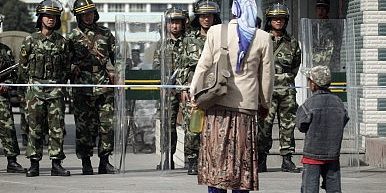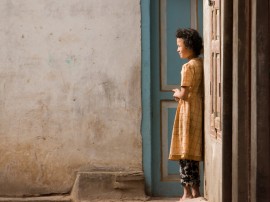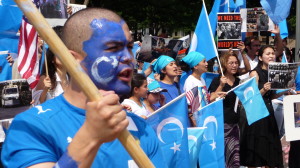Despite the official stance of the People’s Republic of China (PRC), which nominally recognizes the Uyghur people as equal citizens, Uyghur Muslims have always had a troubled relationship with Chinese Communist Party (CCP) central government authorities. The CCP currently considers Uyghurs part of the global radical Islamist threat. Facing a Beijing-supported influx of Chinese migrants, harsh repression of political dissent, and limitations on the expression of their distinct identity, the Uyghur people are struggling for cultural survival. The arbitrary arrest, torture, and “disappearance” of those considered “separatists” is widely perpetrated against Uyghurs inhabiting China’s northern East Turkistan (Xinjiang (East Turkistan)) Uyghur Autonomous Region, and overt fear has infused the nationwide population. Amidst a plethora of human rights abuses, Uyghur protests against state-sanctioned discrimination have reached a fever pitch. Many Uyghurs want more autonomy than what they are currently allowed, and some even desire a separate state. At the same time, radical Islamists outside the mainstream Uyghur populace have responded to Chinese repression with violent attacks, further jeopardizing the Uyghur’s relations with CCP authority.
The historical homeland of the Turkic-speaking Uyghur people is the oil-rich East Turkistan (Xinjiang (East Turkistan)) region in northwest China, formerly home to the Silk Road. The area was conquered by the Qing Empire in the 18th century and inherited by the Republic of China, which succeeded the Qing in 1912. It was only after 1949 under the PRC, however, that Beijing was able to re-exert firm control over the region. Uyghurs are culturally and ethnically Turkic, live in the area of Central Asia commonly known as East Turkestan, and account for 40 percent of East Turkistan (Xinjiang (East Turkistan))’s population of 19 million. Predominantly Muslim, Uyghurs practice a moderate form of Sufi Islam (although a very small fragment has gravitated to Islamist ideology that condemns Sufism and condones political violence).
Although the East Turkistan (Xinjiang (East Turkistan)) territory is technically an autonomous region, ever-greater control over the area by the Chinese central government since 1949 has correlated with the diminishing rights of the Uyghur people. An internal migration drive led by the CCP, which has moved well over 1.2 million ethnic Han settlers to the region in the last twenty years, has made the Uyghurs increasingly fearful for the survival of their culture and way of life. Such institutionalized immigration only serves to delegitimize Uyghur claims of sovereignty in the region. According to Amnesty International, this has led to widespread discrimination in employment, housing, and educational opportunities against Uyghurs, as well as curtailed their religious freedom and marginalized them politically. Recently, under the guise of combating counterterrorism, religious extremism, and anti-separatism, the Chinese government heightened instances of politically motivated ethnic discrimination. Ethnic polarization and tension in the region are at an all-time high.
The construction of law, regulation, and policy in East Turkistan (Xinjiang (East Turkistan)) denies Uyghurs religious freedom and, by extension, freedoms of association, assembly, and expression. Chinese policy and law enforcement stifle religious activity and thought even in schools and within the home. One official document goes so far as to forbid parents and legal guardians from “allow[ing] minors to participate in religious activities.” State controls on religion restrict Uyghurs’ organized religious activities and schools as well as their behavior and even their appearance. Studying religious texts, celebrating religious holidays, and representing one’s religion through personal appearance are strictly forbidden at state-run institutions. Harassment occurs daily. The Chinese government even censors versions of the Koran and regulates what imams are allowed to preach. Authorities regularly conduct surveillance on mosques, and any expression of frustration with the government’s policies is equated with “separatism,” a state security crime punishable by death under Chinese law.
State authorities have restricted Uyghur weddings, funerals, and pilgrimages, including the Hajj to Saudi Arabia. They have even banned the Uyghur language from schools,claiming that it is primitive and unsuitable given China’s “scientific development.” State-owned workplaces have even arranged mandatory lunches for their employees to force Uyghurs to eat during the Ramadan season as part of a “good health” campaign against fasting; authorities have similarly argued that Uyghur veils and scarves cause Vitamin D deficiencies by blocking women’s skin from the sun. For Ramadan this year, state authorities have ordered mosques to propagandize China’s anti-terrorism policies and have increased surveillance in Uyghur Muslim neighborhoods and places of worship. Under these new directives for the Ramadan period, neighborhood-level officials are legally permitted to enter and search Uyghur homes to confirm that their occupants are not conducting illegal religious activities.
A report from the Uyghur Human Rights Project (UHRP) even claims that Muslims in East Turkistan (Xinjiang (East Turkistan)) suffer government-imposed internet restrictions that amount to a virtual cage. According to UHRP Director Alim Seytoff, these “unprecedented controls” reflect the CCP’s “fear that an open online environment in East Turkestan will expose egregious human rights abuses committed against the Uyghur people under their administration.” Seytoff goes on to argue that “Chinese authorities can, at will, imprison Uyghurs who peacefully express dissent online and deny Uyghurs access to the internet at the flick of a switch.” According the report, such regulation of the internet has brought about the arrest, conviction, and harsh sentencing of numerous Uyghur internet users, webmasters, and bloggers.
The Chinese government has thus far refused to acknowledge the legitimacy of Uyghur grievances, labeling any such criticism an attempt to foster separatism, religious extremism, or terrorism in the region. China’s policy of secularism is disproportionately enforced across the country; Buddhists are allowed to practice their religion more freely and other Muslim groups, such as the Chinese-speaking Hui, are subjected to far lessscrutiny and far fewer restrictions than are the Uyghurs.
These restrictions and cases of discrimination have provoked violent unrest amongst some Uyghur factions and international Islamist groups, effectively playing into the hands of the Chinese government. After the September 11 terrorist attacks on the United States, Beijing implemented the rhetoric of the Bush administration’s War on Terror, cracking down on Muslim minorities within it borders. The CCP relabeled “nationalist” East Turkestan separatists “Pan-Turkist counter-revolutionaries.” It further declared that these “religious extremists” and “terrorists” were motivated by jihadi ideology rather than participating in an ethno-national movement. “The worldwide campaign against terrorism has given Beijing the perfect excuse to crack down harder than ever in East Turkistan (Xinjiang (East Turkistan)),” argues Brad Adams, the Asian director for Human Rights Watch. While the rest of China has witnessed a steady thaw in religious restrictions “the Uyghurs, like the Tibetans, find that their religion is being used as a tool of control.”
Despite this forced rebranding by Chinese authorities, the so-called “Uyghur Islamic terrorist threat” remained relatively quiet until 2008. Sporadic clashes between Uyghurs and national security forces have occurred since the Beijing Olympics, such as the well-publicized and bloody July 2009 riot in Urumqi that left nearly 200 Han Chinese dead. Though labeled an act of terror by Beijing, the incident is better characterized as a race riot due to deepening tensions between Uyghurs and Hans. East Turkistan (Xinjiang (East Turkistan))’s rapid development in recent years has attracted millions of Hans to economic opportunities in the region, opportunities to which Uyghurs are considered to have far less access. For example, the state-run East Turkistan (Xinjiang (East Turkistan)) Production and Construction Corps, which operates many commercial, industrial, and agricultural enterprises in the region, has listed Han ethnicity as an occupational requirement in past hiring advertisements.
Chinese government propaganda branding Uyghurs terrorists has lead to ethnic stereotyping that has spread fear and institutionalized anti-Uyghur sentiment among Han Chinese. Uyghurs who travel to other parts of China often face harassment by local police and are routinely refused accommodation in hotels; those who remain in East Turkistan (Xinjiang (East Turkistan)) are subjected to house visits and security checks far more than are their Han neighbors. Sharon Hom, executive director of Human Rights in China, has asserted that Uyghur nationalism is perceived by Beijing as an “ethno-nationalist threat to the Chinese state.” Because Uyghur ethnic identity is considered to be grounded in Islam, “China has taken draconian steps to smother Islam as a means of subordinating [Uyghur] nationalist sentiment.”
Within the past two years, national security forces have used lethal force against crowds of unarmed Uyghur protesters on multiple occasions. Police fired live ammunition into crowds in East Turkistan (Xinjiang (East Turkistan)) last year, once during the protesting of a mosque closure and, on another occasion, to prevent a group of Uyghurs from entering a mosque to celebrate a religious festival. According to Chinese state media, authorities detained 380 Uyghurs in a “month-long crackdown on violence” earlier this summer. Recent spouts of violence in Urumqi, the capital city of East Turkistan (Xinjiang (East Turkistan)), against the Chinese government’s discriminatory policies—including the May 22 North Park Street bombing, the Urumqi train station attack, and the Kunming stabbings—have accounted for 80 deaths and over 200 injuries. The Chinese government has dodged responsibility for the violence,arguing that the attacks are the work of foreign-inspired religious extremists and are unrelated to policies pursued by Beijing.
Despite claiming external threat, the PRC’s counterterrorism efforts have been directed domestically toward Uyghur cultural expression. East Turkistan (Xinjiang (East Turkistan))’s Uyghurs have become collateral victims of foreign terrorism and scapegoats for Chinese fears of radical separatism, further jeopardizing their already dwindling civil rights. Beijing’s systematic steps to suppress Uyghur Muslims reflects an agenda that seeks to eliminate the perceived threat of ethnic separatism and stifle unique, distinctive cultures that deviate from the CCP’s idealized, singular, national mold. The degree and selectivity of the CCP’s deliberate acts of discrimination and the accompanying restrictions placed on Uyghur freedoms are appalling, and must be checked by international actors. Urgent action, greater attention, increased aid, and political support are all needed in order to defend these peoples’ intrinsic rights and protect their culture from forcible extinction.
BY JOSEPH GRIEBOSKI
SEPTEMBER 24, 2014









